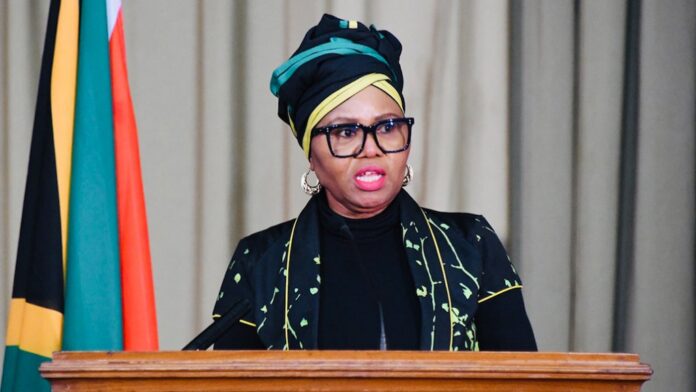Pretoria: In commemoration of World Elder Abuse Awareness Day, the Minister of Social Development, Ms Lindiwe Zulu, joins the citizens of the world to commemorate and call upon South Africans to respect, defend and uphold the dignity, integrity and safety of older persons.
Under the theme, “Digital Equity for All Ages,” the day, which seeks to prioritise the protection of the lives and the wellbeing of the country’s older persons, is about raising awareness about the need for access and meaningful participation in the digital space for senior citizens.
Hence this day is focused on ensuring that older persons are digitally empowered.
Minister Zulu calls upon S.Africans to respect, protect & uphold dignity has confirmed that it has an ageing population, with estimates indicating that the proportion of older persons aged 60 years and older has grown from 7,6% in 2002 to 9,1% in 2020.
It was projected that by 2015 the proportion of older persons in South Africa will have increased to 9.5% of the population, that is, 4.24 million older persons.
In July 2020, about 5,43 million people in South Africa were aged 60 and above. This older person population increase heightens the concern about elder abuse and neglect.
Historically, the World Elder Abuse Awareness Day was initiated by the International Network for the Prevention of Elder Abuse (INPEA) in 2006 and recognised as a United Nations Day by the General Assembly in its resolution A/RES/66/127, adopted in 2011.
This day is intended to raise public awareness of elder abuse and the remembrance of those who died as a result of elder abuse. Elder abuse is a serious problem that affects millions of older persons.
Its commemoration, therefore, provides an opportunity for communities around the world to promote a better understanding of the abuse and neglect of older persons by raising awareness of the cultural, social, economical and demographical processes affecting elder abuse and neglect.
Older persons face various kinds of mistreatment and discrimination. Elder abuse is global public health, human rights, and criminal justice problem. It goes beyond socioeconomic classes, regions, languages, and ethnicities but remains an understudied and under-reported phenomenon.
The COVID-19 pandemic has demonstrated how technologies can help fight the spread of the virus, sustain daily life, support business continuity and keep people socially connected. It has also shown that those who are excluded from the digital transformation are older persons who are at an increased risk of being permanently left behind. Digital equity for all ages is, therefore, more important than ever.
In response to these challenges, the Minister of Social Development, Ms Lindiwe Zulu, emphasises that “Digital technology is a key component to fully participate in society through their independence which can be realised as they access information easily, and stay connected with their families and friends.
Older persons are also encouraged to participate in intergenerational programmes and provide mentoring and coaching of new and emerging professionals and younger generations.”
As the older persons are recovering from the impact of COVID-19, the devastating floods in KZN and Eastern Cape also remain a blow to the recovery plan in South Africa, especially the impact it had on the lives and well-being of older persons. Older persons living in their homes and residential facilities were negatively affected by the floods.
This year’s commemoration coincides with two important events, namely, the commencement of the United Nations Decades of Healthy Ageing (2022-2030), which marks the beginning of ten years of concerted collaboration with diverse stakeholders on improving the lives of older people, their families and communities in which they live.
The second event is the 20th milestone of the Second World Assembly on Ageing and the fourth review and appraisal of the implementation of the Madrid International Plan of Action on Ageing (MIPAA).
It also comes after Minister Zulu tabled in Parliament the Department’s budget vote to the National Council of Provinces.
In support of these international occasions, the South African government recently finalised the Older Persons Amendment Bill, and Chapter five (5) of this legislation focuses on strengthening intersectoral collaboration for the effective protection of older persons and management of abuse of the elderly.
In addition, through the Department of Social Development, the government facilitated the establishment of the Older Persons Abuse Register, an initiative managed in partnership with the Department of Justice through the Integrated Justice System.
The training of the system users and key stakeholders is currently underway across provinces since the year 2021, and the training continues during this financial year to ensure the capturing and processing of all reported cases of abuse of older persons.
Through this initiative, the Department has reached over two hundred social workers, as well as key stakeholders in the field of ageing, which should lead to improved reporting, successful prosecution and safety of older persons.
In commemoration of this day, the Minister would like to encourage all South Africans to ensure that we leave no older person behind as we move into the digital space. Such exposures should lead to the empowerment of older persons, thus ensuring their ability to respond to their varied instances of abuse.
We also pause to remember all senior citizens who succumbed to COVID-19 over the recent years.
